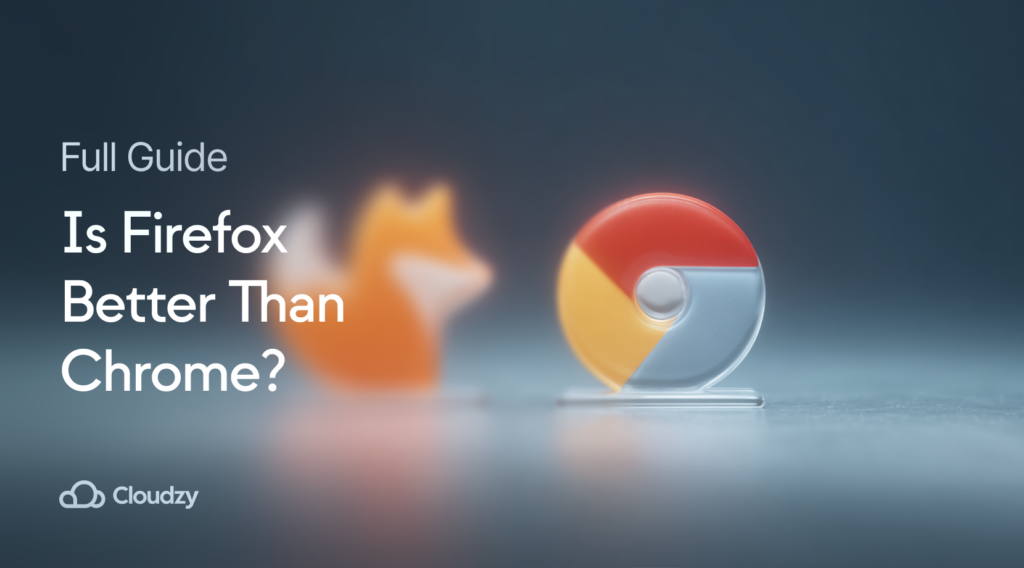Choosing a web browser affects speed, privacy, security, battery life, and overall browsing efficiency. In 2026, Chrome vs. Firefox remain the most widely used browsers. Both have strengths and trade-offs depending on usage patterns, device type, and privacy priorities.
This article provides a complete comparison of Firefox vs. Chrome in 2026, covering performance, memory use, security, privacy, features, ecosystem, customization, usability, market share, mobile performance, and VPN compatibility.

Firefox vs. Chrome: Performance Comparison
Performance remains a critical factor in 2026. Desktop performance varies depending on hardware, operating system, and workload.
Is Firefox Faster than Chrome?
Firefox has steadily improved speed and multi-tab performance through optimizations in the Gecko engine. Official Mozilla documentation notes ongoing enhancements aimed at faster page loads and smoother responsiveness across workloads. Chrome emphasizes runtime efficiency and responsiveness for complex web applications, supported by its official DevTools performance profiling tools.
While Chrome may edge out Firefox in raw JavaScript benchmarks, Mozilla’s AreWeFastYet dashboard shows that real-world page load times and interaction performance are generally competitive, with Firefox often handling memory pressure in multi-tab sessions more efficiently. Differences in everyday browsing speed are typically minor and workload-dependent, making both browsers suitable for high-performance use. For more on memory efficiency, see Which Browser Uses the Least Amount of RAM.
Memory Use in Firefox vs. Chrome
Chrome’s multi-process model improves stability but increases RAM usage. Benchmark Reports show that controlled benchmark suites show Firefox’s memory footprint can be significantly lower than Chrome’s under equivalent multi‑tab conditions, consistent with lower RAM use in heavy workloads.
Battery Life
Firefox is generally more energy-efficient on laptops. Chrome’s background processes and higher memory use can increase power consumption. Empirical efficiency testing that includes power measurements indicates that Firefox’s architectural choices can translate into longer battery life in extended browsing sessions compared with Chrome.
A Short Note: Beyond browser choice, shifting workloads to a VPS can raise performance without new hardware. By moving processing and resource-heavy tasks off the local device, a VPS reduces pressure on CPU, memory, and battery during sustained browsing or work sessions.

Security and Privacy Features
Firefox and Chrome diverge primarily in default security posture and privacy enforcement. Both implement threat mitigation and provide configurable secure connection options, establishing the foundation for their architectural and behavioral differences.
Safe Browsing Tools
Chrome uses Google Safe Browsing to identify and warn users about phishing, malware, and malicious downloads through real-time threat checks. Firefox implements analogous protections while integrating script blocking and tracking prevention by default. These distinctions frame how each browser prioritizes default protection against malware versus tracking.
Privacy Settings
Firefox’s Enhanced Tracking Protection automatically blocks cross-site trackers and isolates third-party cookies, reducing cross-site data leakage. Chrome requires explicit user configuration to achieve comparable tracking mitigation. This establishes a clear contrast in baseline privacy enforcement.
AI Control
Firefox 148, rolling out on February 24, 2026, introduces a dedicated AI controls section in the browser settings that lets users manage or completely disable AI‑powered features with a single master toggle called Block AI enhancements. This toggle turns off all current and future generative AI tools in the browser and preserves those preferences across updates.
Chrome does not provide a single unified toggle to disable all AI features, instead it exposes per‑feature settings for individual AI tools in areas like DevTools, and enterprise or local policies can disable specific capabilities.

Firefox vs. Chrome: Features and Ecosystem
Chrome integrates tightly with Google services and has a large extension library. Firefox emphasizes encrypted sync, open standards, and user control.
Both sync bookmarks, passwords, and tabs. Chrome has more extensions; Firefox focuses on privacy tools. Firefox also allows deeper UI customization, including toolbars, menus, themes, and container tabs. Chrome keeps a simpler, consistent layout.
Device Synchronization and User Profiles
Chrome allows seamless synchronization across devices through a Google account, including bookmarks, passwords, open tabs, and extensions. Firefox offers similar functionality using a Firefox account, syncing add-ons, bookmarks, passwords, and settings with encrypted storage for stronger privacy.
Google Chrome supports silent installation as part of its enterprise deployment tooling, allowing administrators to install and configure the browser across multiple systems without user interaction. This capability integrates with centralized device management and policy enforcement workflows, particularly in environments using Google Workspace or third-party MDM solutions.
Mozilla Firefox also supports enterprise deployment via policy-based configuration and administrative templates, though its management tooling is less tightly integrated with a single platform ecosystem.
Browser Ecosystem (Extensions and Services)
Chrome has a much larger library of extensions, estimated over 200,000, whereas Firefox has around ~60 000 extensions and add‑ons. Firefox focuses on privacy-centric extensions, while Chrome’s library covers a wider variety of productivity, developer, and entertainment tools.
Customization Options for Firefox vs. Chrome
Firefox supports extensive customization, including toolbar layout, menu organization, keyboard shortcuts, themes, and container tabs. Chrome offers limited toolbar customization and minimal menu modifications. Users who prefer full control over their browsing environment benefit from Firefox.
For features and ecosystem, Chrome offers a larger extension library and tighter integration with Google services, while Firefox emphasizes privacy-focused add-ons, encrypted sync, and extensive interface customization. Your choice depends on which one you prioritize: tool breadth and service integration (Chrome) or privacy and customization control (Firefox).

Browsing Experience and Usability
Both browsers render pages reliably with modern UIs, but control differs. Chrome uses a horizontal tab bar with grouping and pinning. Firefox adds vertical tabs, pinned tabs, and container tabs for better multi-tab management.
Firefox supports customizable context menus and keyboard shortcuts for power users. Chrome provides a simpler, uniform system prioritizing consistency.
Tab Navigation and Management
Chrome uses a horizontal tab bar with grouping and pinning options. Firefox supports vertical tab bars, pinned tabs, and container tabs for separating browsing sessions. These features allow better organization, especially in heavy multitasking scenarios.
Context Menus and Shortcuts
Firefox extensions can add items to the browser’s menu system using the WebExtensions menus API. This lets an extension insert custom entries into right‑click menus, but it does not give users a built‑in browser setting to rebuild the entire default context menu on their own. You can hide default menu items and supply your own via menus.overrideContext, which still comes from an extension rather than a user setting.
Popularity and Market Share
Shaped by usage and market presence, browsers evolve in ways that affect their extension ecosystems, web application support, enterprise integration, and long-term platform backing. Market share influences which features receive priority and which audiences are targeted, setting the stage for differences in speed, customization, and security approaches that I’ll examine in detail in the following sections.
Usage Statistics
Chrome dominates usage in 2026, particularly on mobile. According to StatCounter:
- Desktop worldwide market share: Chrome ~71%, Firefox 2–3%
- Mobile worldwide market share: Chrome ~63%, Firefox ~3%
Firefox maintains a smaller but dedicated desktop audience drawn to privacy and control. Chrome’s dominance underpins its extensive extension library and broad compatibility with web apps. These patterns shape IT adoption, enterprise deployment, and developer support, framing the comparison between the two browsers.

VPN Compatibility
Both Firefox and Chrome support third-party VPN browser extensions that encrypt browser traffic and mask IP addresses. Permissions are granted at install time and can be reviewed or revoked later in both browsers. Privacy strength, encryption quality, and logging practices are determined by the VPN service, not the browser itself.
Mobile Performance
Page load speed varies by device and network conditions, but both browsers are fast and comparable. Firefox often uses less memory on low-RAM devices, while Chrome integrates more tightly with Android services. Privacy defaults are consistent in Firefox across mobile and desktop platforms, whereas Chrome relies on additional extensions for advanced tracking protection.

Summary Table
This table provides a high-level comparison of Firefox vs. Chrome across key browser priorities in 2026. Columns show the browser’s performance in each area, along with notes highlighting real-world implications for users. Use this as a reference for which browser may suit specific needs in performance, privacy, security, and ecosystem.
| Feature / Priority | Firefox | Chrome | Notes |
| Performance | Competitive page rendering and UI responsiveness | Strong JavaScript execution and UI responsiveness | Real-world page load times are similar on modern hardware |
| Memory Use | Tends to use fewer processes by default | Uses many isolated processes per tab and extension | Chrome’s model raises RAM use; Firefox exposes process limits |
| Battery Life | Can reduce background activity and CPU wakeups | Can draw more power with many active tabs | Results vary by workload and extensions |
| Privacy | Tracker and cross-site cookie blocking on by default | Basic protections on by default | Firefox applies stricter defaults without add-ons |
| Security | Site isolation, sandboxing, frequent updates | Strict per-site sandboxing, frequent updates | Both meet modern browser security standards |
| Features | Sync, containers, reader view, privacy controls | Sync, tab groups, built-in Google service links | Feature focus differs more than feature count |
| Customization | Toolbar, theme, container tabs, layout controls | Limited UI changes without extensions | Neither browser supports full menu or shortcut rewrites |
| Tab Management | Vertical tabs, pinned tabs, container tabs | Horizontal tabs, tab groups, pinned tabs | Firefox gives more built-in layout choice |
| VPN | Works with third-party VPN apps and add-ons | Works with third-party VPN apps and add-ons | Neither browser includes a built-in VPN |
| Popularity | Desktop and mobile single-digit share | Dominant on desktop and mobile | Usage data reflects ecosystem reach, not quality |
Firefox vs. Chrome: Which Browser Should You Choose?
In 2026, Firefox vs. Chrome shows clear differences: Chrome leads in extension variety, Google service integration, and productivity workflows, while Firefox emphasizes privacy, memory efficiency, and extensive customization. Although overall performance gaps remain small, Chrome tends to lead in JavaScript benchmark results, whereas Firefox generally operates with lower memory consumption and achieves longer battery endurance during sustained, multi-tab browsing workloads.. Both are secure, with Firefox adding stronger privacy protections and AI controls. Mobile trends mirror desktop, and both support VPNs, with Firefox compatible with privacy-focused services.



